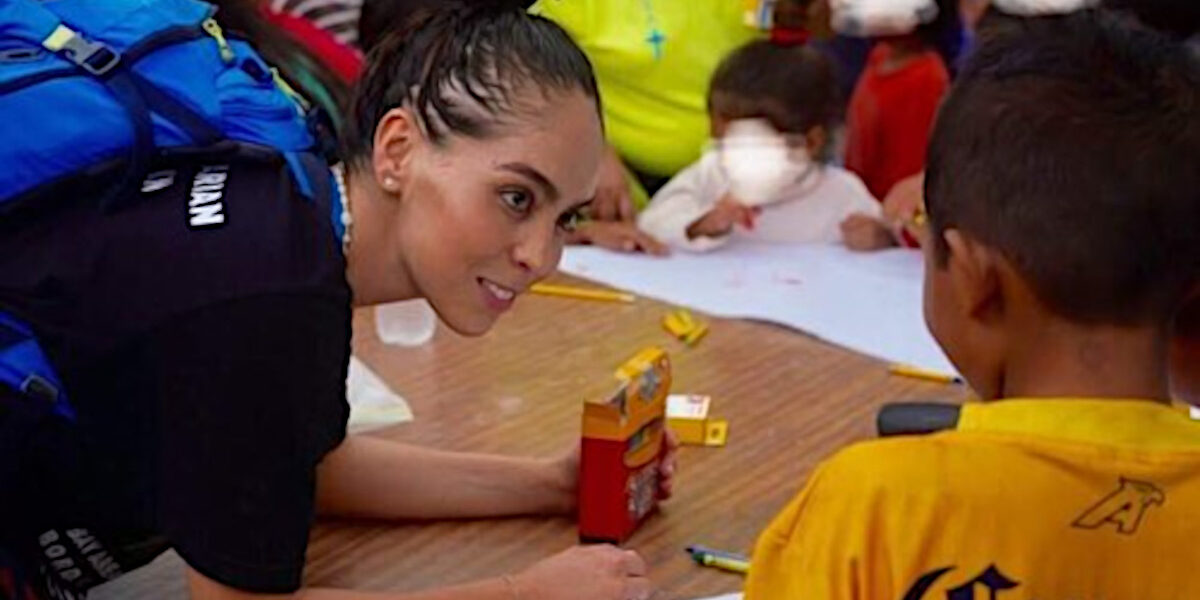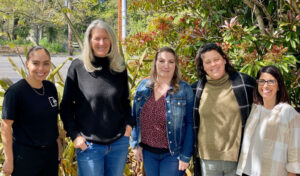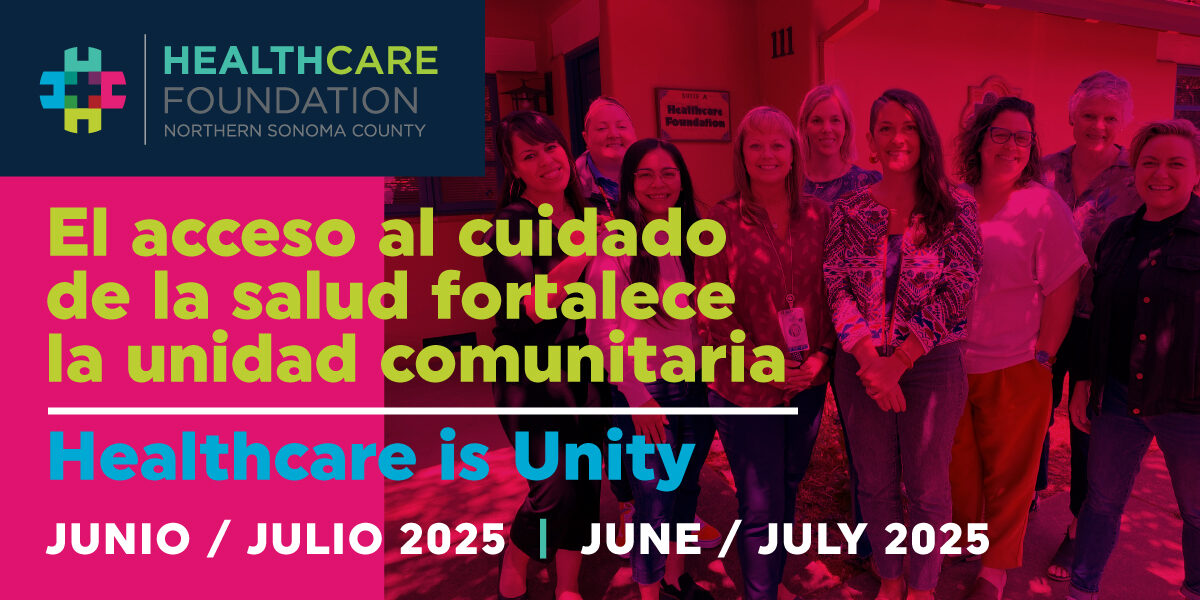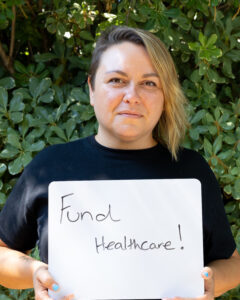

Community Partner Spotlight: Daniela Domínguez of On the Margins
Daniela Domínguez, founder of On the Margins, has been instrumental in supporting the Healthcare Foundation’s Mental Health Talent Pipeline program.

Daniela Domínguez has been collaborating with the Healthcare Foundation in several capacities. As an assistant professor in the counseling psychology department at USF and the coordinator of its Marriage and Family Therapy program, Daniela has been instrumental in supporting the Healthcare Foundation’s Mental Health Talent Pipeline program, which grants scholarships to local bilingual and bicultural graduate students pursuing their training in Marriage and Family Therapy.
Daniela is also the founder of On the Margins, a multi-service Bay Area organization of health professionals, artists, researchers, and consultants that “seeks to amplify community care, cultural wealth, and resilience in bold and politicized ways.” On the Margins has recently embarked on a two-year participatory research project with a collective of northern Sonoma County community-based organizations to develop a community-led plan for the realization of a Community Wellness Center in Cloverdale—a project made possible by a grant from the Northern Sonoma County Healthcare District secured earlier this year by the Healthcare Foundation.
Daniela will also be helping to host the festivities next month at Noche de Amor, the Healthcare Foundation’s annual celebration raising awareness and funds for its programs, including its Mental Health Talent Pipeline.
We spoke with Daniela recently about the nature of the work she does at On the Margins, as well as the importance of developing a support pipeline for aspiring bilingual and bicultural mental health clinicians like herself.
The following transcript has been lightly edited for length and clarity.
What makes On the Margins distinct in the work that it does in Sonoma County?
At On the Margins we believe that mental health concerns are very often connected to oppressive systems. In the work we do in mental health, we center racial, gender, economic, and ecological justice. Justice is the focus of the work we’re doing. Even the name of the organization, On the Margins—the message we’re trying to send is: that’s where we start. When we’re thinking about initiatives and policies we want to implement, we’re thinking about how this is going to benefit the communities who have not been seen, heard, or valued in our wider society. We’ve been able to translate [our approach] into three different components. First, focusing on taking care of ourselves by addressing compassion fatigue, secondary trauma, and trying to engage in joy-filled activities, because that’s what helps us to do the difficult work. That’s being in right relationship to self. The second component is being in right relationship to others. That means starting on the margins of society and hopefully creating a ripple effect that moves beyond the margins, because we do believe that if we start on the margins everyone else will benefit. The third component is right relationship to the land. That’s where the ecological justice component comes in. We talk about the interconnectedness of those relationships to the land, to others, and to ourselves. That’s the difference in our approach. When people talk about mental health, they often talk about self-care. I think that concept has been commodified in many ways. You eat your avocado toast, and so on. It’s beyond that. If you are impacted by poverty or by racism, that approach to self-care is only going to go so far. We’re trying to think about ways to address mental health concerns at the individual, mutual-aid community, and macro levels.
“When people talk about mental health, they often talk about self-care. I think that concept has been commodified in many ways. . . . We’re trying to think about ways to address mental health concerns at the individual, mutual-aid community, and macro levels.”
Daniela Domínguez, Founder, On the Margins
How did you come to found an organization based on this approach?
Throughout my training as a clinical psychologist, I remember a lot of my professors spending a lot of time inside the research lab at the university. That was very much the way in which I was trained to conduct research within an educational institution. As someone who has a special interest in Latinx mental health and working with Black, Indigenous and other communities of color, I realized that that technique was only going to take me so far, because the people who were coming into the research lab were not necessarily representative of the communities that I was seeing in the therapy room. So I pursued training in community-based participatory action and research approaches, and ways to connect community engagement with data collection and data interpretation. At On the Margins, rather than expecting community members to come to a research lab, we expect the researcher to use a boots-on-the-ground approach, to go out to the community and establish relationships. There is this idea that the researcher is this objective individual who just listens and documents and interprets; that’s really not the case. You have to be immersed in the community for community members to feel comfortable sharing what their interests are, what their hopes and dreams and desires and challenges are. That takes time. It requires patience, and it requires commitment.
How does this approach show up in the Community Wellness Center project that recently launched in Cloverdale?
The Community Wellness Center program in Cloverdale is grounded in participatory research. Instead of me, as a researcher, manipulating variables, I’m tapping into what is emergent, accessing what is coming up for the community. All I do is ask questions, and that’s why it takes some time. Because what we’re trying to do is basically develop a roadmap with the community.

We’re working with La Familia Sana, Alexander Valley Healthcare, and Nuestra Comunidad. We’ve already started—we’re in the process of coming together as a collective, building rapport, working out the research design, trying to figure out the best way to connect with the community and learn from them. The collective has named the project “Nuestra Comunidad Sana,” which is a really interesting name, basically a combination of La Familia Sana and Nuestra Comunidad. I’ll read you the goal as formulated by the collective: “The objective of Nuestra Comunidad Sana is to use a grassroots approach led by BIPOC Cloverdale communities to envision a safe, vibrant, green space of belonging.” With that objective in mind, this first year On the Margins will be publishing the research design and collecting the data. Next year, we’ll be analyzing that information, and reporting back and disseminating it. The hope is that once we have a clear understanding of that desired vision of the community wellness center, it will be built, and then people can enjoy it.
At On the Margins we see the community members as co-researchers. There are different ways we’re going to be collecting the data—individual interviews, focus groups, community forums, surveys, and participatory mapping. All of that is connected to the end goal of having a clear understanding of the type of community wellness center that the Cloverdale community would hope to see. It’s a two-year project. It’s going to take a strong community effort and we’re fortunate to have been selected to help with facilitation and data interpretation. We’re really excited to be collaborating on it.
So a future community wellness center would come about through, and ultimately be driven by, the collective imaginations of community members, their ideas as well as their interests and energies.
Yes, we’re radically imagining together. That’s really exciting because the communities we plan to interview are communities that haven’t been asked what their hopes and dreams and desires are. They haven’t been necessarily invited to radically imagine the possibilities. So the idea of being in a space where we can co-conspire and think together about how we’re going to go about doing that is super exciting for me.
“From the standpoint of the need, the Mental Health Talent Pipeline is a dream come true. . . . Students are going to benefit, clinicians are going to benefit, and clients are going to benefit. The whole community will benefit as a result as well.”
Daniela Domínguez, Founder, On the Margins
You’re participating in July’s Noche de Amor celebration, which includes raising funds to support the Healthcare Foundation’s Mental Health Talent Pipeline. What are you looking forward to at Noche de Amor?
It’s not surprising to anyone at this point that, here in northern Sonoma County, we’re in need of culturally responsive mental health services, specifically bilingual and bicultural support. As a bilingual, bicultural clinician, I can tell you that my caseload is absolutely packed, I’m very booked. Any other bilingual, bicultural clinician in my network—their calendar looks similar. We’re struggling. We’re seeing that communities are in great need but we’re facing a real shortage of therapists, resulting in a wear-and-tear on clinicians who are supporting monolingual Spanish-speaking communities. We need to be supporting in any way we can the amplification of a bilingual, bicultural pipeline.
From the standpoint of the need, the Mental Health Talent Pipeline is a dream come true. For as long as I can remember, it has been a professional dream of mine to figure out a way to offer full scholarships to students who are Spanish-speaking. My hope for Noche de Amor is that we can communicate how critical these funds are in supporting the clinical population—those of us who are mental health professionals who are overwhelmed by the utilization of these services—and how that is going to have a ripple effect. Students are going to benefit, clinicians are going to benefit, and clients are going to benefit. The whole community will benefit as a result as well. Even having just four more clinicians per year out supporting the northern Sonoma County population, that is so significant.
I also want to say that this program is, honestly, rare. I teach at USF Sacramento, at USF San Jose, and at San Francisco, and no other campus has a program like this. It says a lot about the priorities of the Healthcare Foundation and its funders that they are centering mental health at this time in such an intelligent and innovative way. This is a win to celebrate and a program to continue. So I’m looking forward to advocacy and inspiration at Noche de Amor, and also celebration of what we’ve been able to accomplish thus far.

Related News + Stories
Invest in Our Community
Your support is vital to our collective vision of eliminating health inequities in northern Sonoma County.
Donate



